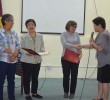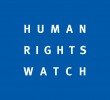4 June 2012
Advocates to House: Walk the talk, too!
Senate casts unanimous endorsement of FOI, transparency as norm
Coalition statement on the FOI bills
(Statement of the Right to Know, Right Now! Coalition on Senator Honasan’s sponsorship of the committee report on the FOI bills)
Within days after casting a guilty verdict on former Supreme Court Chief Justice Renato C. Corona, 22 of the 23 senators affirmed support for the passage of the Freedom of Information (FOI) Act and endorsed the committee report of Sen. Gregorio B. Honasan II, chairman of the Senate Committee on Public Information.
Twenty-two senators signed on to Honasan’s report that consolidates several FOI bills at the Senate, firm evidence of the Senate’s commitment to institutionalize transparency and access to information as the norm, practice and obligation of all public officials and employees. Honasan formally sponsored the FOI bill at the Senate plenary session today, June 4, 2012.
The Senate’s decision to give the FOI Act a fighting chance is in stark contrast, however, to the extended inaction on the FOI bills at the committee level at the House of Representatives.
The Senate last week convicted Corona for culpable violation of the Constitution and betrayal of public trust when he failed to disclose the full details of his wealth in his statement of assets, liabilities, and net worth (SALN). The House whisked straight off to the Senate the articles of impeachment after 188 of about 250 House district and party-list members had endorsed it on Dec. 12, 2011.
The FOI bill had been filed, refiled, and rebuffed by the House members over the last 14 years. Today it still remains in limbo at the House due to the inaction on the part of House Committee on Public Information Chairman Ben Evardone, despite the President’s endorsement of the bill as early as January this year.
A People’s Bill
We commend the Senate Committee for keeping intact a progressive, pro-people FOI bill, even as it accommodates amendments proposed by Malacañang. The report used as basis the bicameral conference committee report that almost passed in the 14th Congress, and includes two amendments introduced by Malacañang to address concerns on national security matters and the President’s ability to get free and frank advice in the deliberation of decisions.
First, the words “national security” were inserted in exception (a), thereby expanding the concept of national security beyond national defense and foreign affairs, as follows:
“SECTION. 6. Exceptions. – x x x
(A) The information is specifically authorized to be kept secret under guidelines established by an executive order, and in fact properly classified pursuant thereto: Provided, That 1) The information directly relates to national security or defense and its revelation may cause grave damage to the national security or internal and external defense of the State; or 2) The information requested pertains to the foreign affairs of the Republic of the Philippines, when its revelation may weaken the negotiating position of the government in an ongoing bilateral or multilateral negotiation or seriously jeopardize the diplomatic relations of the Philippines with any state: Provided, further, That the executive order shall specify the reasonable period after which the information shall be automatically declassified or subject to mandatory declassification review, and that any reasonable doubt as to classification and declassification shall be settled in favor of the right to information;
Second, a new exception was introduced relating to the President’s deliberative process and communications privilege, as follows:
“SECTION 6. Exceptions. x x x
(B) The information consist of records of minutes, records of advice given or records of opinions expressed during decision-making or policy formulation, invoked by the Chief Executive to be privileged by reason of the sensitivity of the subject matter or by reason of the impairment of the Chief Executive’s deliberative process that would result from the disclosure thereof. Once policy has been formulated and decisions made, minutes and research data may be made available for disclosure unless they were made in executive session. ”
Contrary to fears that these amendments “watered down” the FOI bill, the changes further balance legitimate interests involved in FOI. The public interest in protecting national security matters and in the President’s ability to secure confidential advice in the deliberation of policy is widely recognized, and is found in existing FOI legislations around the world.
To countervail the expansion of exceptions, the committee report preserved and strengthened the safeguards against abuse of exceptions that we have fought for. These safeguards include:
The narrow scope of the exceptions, achieved by specifying the harm on public interest that we wish to avoid to justify the confidentiality;
The reiteration of the jurisprudence that the burden of proving an exception lies with government;
The qualification that the exceptions are to be strictly construed;
The prohibition against using exceptions to cover-up a crime, wrongdoing, graft, or corruption;
The qualification that the President, the Supreme Court, the Senate, the House of Representatives, and the Constitutional Commissions may waive an exception with respect to information under their respective control, when they deem that there is an overriding public interest in disclosure;
The proviso that access to information shall not be denied if public interest in the disclosure of the information outweighs public interest in securing its confidentiality; and,
The imposition of criminal liability for claiming an exception when such claim is manifestly devoid of factual basis.
We also note the expansion of the list of documents that need to be disclosed without need of request, to include the SALNs of the highest officials of the country, pursuant to Art. XI, Sec. 17 of the Constitution. This removes any more excuse to withhold SALNs from the public, consistent with the intent of the Constitution that the burden to lead by example rests on the holders of the greatest power.
In sum, the Senate committee’s substitute bill, if passed, secures the following gains for the people:
It will impose a uniform and speedy procedure for access to information, thereby removing the room for administrative avoidance;
It will free the broadest amount of non-sensitive information for easy access by citizens in availing of government services;
It lays down clear limits on exceptions, subject to safeguards against abuse;
It identifies a list of documents of high public interest that are required to be disclosed without need of request, including SALNs;
It introduces basic standards on government’s record keeping and introduces various mechanisms to facilitate easy access of information; and,
It introduces better remedies to denial of access and violation of our right to information, including the imposition of administrative and criminal liability.
Finally, we commend Senator Honasan’s initiative to deepen the conception of the right to information, from one based mainly on principles of accountability, anti-corruption, and people’s participation, to include the idea that the people own the information held by government. The committee report based this assertion on the first Constitutional principle (Article II, Section 1 of the 1987 Constitution) that “sovereignty resides in the people and all government authority emanates from them”.
House Should Walk the Talk and Act on FOI Now
We look to the Senate for leadership on FOI by working for the speedy approval of the committee report on second and third reading.
Unfortunately, just like in the 14th Congress, the efforts of the Senate will only be put to waste if the House of Representatives of the 15th Congress again fails or refuses to do its part.
It is in this context that we reiterate our call for Rep. Ben Evardone to perform his duty as committee chairman, and immediately call a hearing to resolve the remaining contentious issues in the committee, and submit a committee report for plenary action. We renew our appeal to Speaker Belmonte to stand on the side of the people and include the passage of the FOI Bill in the House priorities. As much as he denounced the glib excuses that former Chief Justice Renato Corona gave to account for his non-disclosure of substantial dollar and peso deposits, so too we look to him to assert strong leadership to thwart glib excuses for the non-movement of the FOI in the House and get it debated and approved at the soonest.
We call on the Executive to act on its endorsement of the FOI bill with the same resolve as it had on the postponement of the ARMM election, the impeachment of Chief Justice Corona, and the ongoing legislation of the sin taxes. Given the apparent resistance to FOI in the House of Representatives, strong executive support is imperative for the FOI law to finally pass.
All policy commitments and directions of the present administration — Daang Matuwid, steering committee membership in the Open Government Partnership, institutional reforms for good governance — point to the necessity of passing the FOI law. We firmly stand with all those who assert the people’s right to information, and with political leaders in the Executive and Legislative branch who are working to operationalize the State’s guarantee of freedom of information that is rightfully owned by the people.
We hold on to the hope that our leaders will transform rhetoric and promises into reality, and finally muster the sincerity and political will to pass the FOI law.
The Right to Know. Right Now! Coalition
Signed:
1. Atty. Nepomuceno Malaluan
Co-Director, Institute for Freedom of Information and
Co-Convenor, Right to Know. Right Now! Coalition
2. Mr. Vincent Lazatin
Executive Director, Transparency and Accountability Network
3. Ms. Malou Mangahas
Executive Director, Philippine Center for Investigative Journalism
4. Bishop Broderick Pabillo
Chairman, Catholic Bishops’ Conference of the Philippines – National Secretariat for Social Action-Justice and Peace (CBCP-NASSA)
5. Rep. Walden Bello
AKBAYAN Party
House of Representatives
6. Ms. Annie Geron
General Secretary, Public Services Labor Independent Confederation (PSLINK)
7. Mr. Joshua Mata
Secretary General, Alliance of Progressive Labor (APL)
8. Ms. Yuen Abana
Campaign Coordinator, Partido ng Manggagawa
9. Mr. Ramon R. Tuazon, President
Dr.
Florangel Rosario-Braid, President Emeritus & Senior Adviser
Ms. Madeline B. Quiamco, Dean
Asian Institute of Journalism and Communication
10. Mr. Red Batario
Executive Director, Center for Community Journalism and Development
11. Dr. Antonio La Viña
Dean , Ateneo School of Government
12. Prof. Leonor M. Briones
Lead Covenor, Social Watch Philippines
13. Atty Eriene Jhone Aguila
Kaya Natin! Movement for Good Governance and Ethical Leadership
14. Ms. Clarissa V. Militante
Coordinator, Focus on the Global South, Philippines Programme
15. Mr. Jun Aguilar
Mr. Elso Cabangon
Filipino Migrant Workers Group
16. Mr. Sixto Donato C. Macasaet
Executive Director, Caucus of Development NGO Networks (CODE-NGO)
17. Ms. Ana Maria R. Nemenzo
National Coordinator, WomanHealth Philippines
18. Mr. Max M. De Mesa
Chairperson, Philippine Alliance of Human Rights Advocates (PAHRA)
19. Ms. Maxine Tanya Hamada
Executive Director, The International Center for Innovation, Transformation and Excellence in Governance (INCITEGov)
20. Mr. Norman Cabrera
Secretary General, Ang Kaptiran Party
21. Fr. Albert E. Alejo, SJ
Team Leader, Ehem! Anticorruption Movement
22. Ms. Ellene Sana
Executive Director, Center for Migrant Advocacy
23. Ms. Jessica Reyes-Cantos
Lead Convenor, Rice Watch and Action Network
24. Mr. Carlo Brolagda
Chairperson, College of Social Sciences and Philosophy Student Council, UP Diliman
25. Mr. Viko Fumar
Chairperson, BUKLOD CSSP, UP Diliman
26. Mr. Jong Pacanot
Freedom from Debt Coalition – Southern Mindanao
27. Mr. Mike Lopez
Movement of Students for Progressive Leadership in UP (MOVE UP)
28. Atty. Elpidio V. Peria
Executive Director, Biodiversity, Innovation, Trade and Society (BITS) Policy Center
29. Sr. Pilar Versoza, Founder
Mr. Eric B. Manalang, President
Prolife Philippines Foundation
30. Mr. Edgardo J.T. Tirona
Former President, Council of the Laity of the Philippines and Society of St. Vincent de Paul.
31. Mr. Edilberto M. Cuenca
Lay Coordinator, Commission on Family & Life, Vicariate of Sts. Peter and Paul, Makati City
32. Mr. Bart Guingona
President, pagbabago@pilipinas
33. Atty. Corazon Fabros, Lead Convenor
Ms. Abeline Salacata, Secretariat
Stop the War Coalition
34. Ms. Joy Aceron
Program Director, Government Watch/ PODER, Ateneo School of Government
35. Mr. Jojo Ibanez Jr.
Alliance of Progressive Labor – Davao
36. Ms. Mary Ann Manahan
Co-convenor, Save Agrarian Reform Alliance
37. Ms. Starjoan D. Villanueva
Executive Director, Alternate Forum for Research in Mindanao (AFRIM)
38. Mr. Alain Pascua
President, KAAKBAY Partylist
39. Mr. Juanito C. Enriquez, Jr.
Managing Director, Civil Society Organization Forum for Peace, Inc.
40. Mr. Salvador H. Feranil
Managing Director for Mindanao, Philippine Network of Rural Development Institutes
41. Raul Socrates C. Banzuela
National Coordinator, Pambansang Kilusan ng mga Samahang Magsasaka (PAKISAMA)
42. Dr. Sylvia Estrada-Claudio
Director, University of the Philippines Center for Women’s Studies.
43. Dr. Joseph Anthony Lim
Professor, Economics Department, Ateneo De Manila University
44. Mr. Filomeno S. Sta. Ana III
Coordinator, Action for Economic Reforms
45. Ms. Jenina Joy Chavez
Director, Southeast Asia Monitor for Action
[box type=”info”] IMPORTANT NOTICE: INBOX is an archive of press releases, statements, announcements, letters to the editors, and manifestos sent to Davao Today for publication. Please email your materials to davaotoday@gmail.com. Davao Today is not responsible for the content of these materials. The opinion expessed in these items does not reflect those of Davao Today and its staff. Please refer to our terms of use/disclaimer.[/box]










